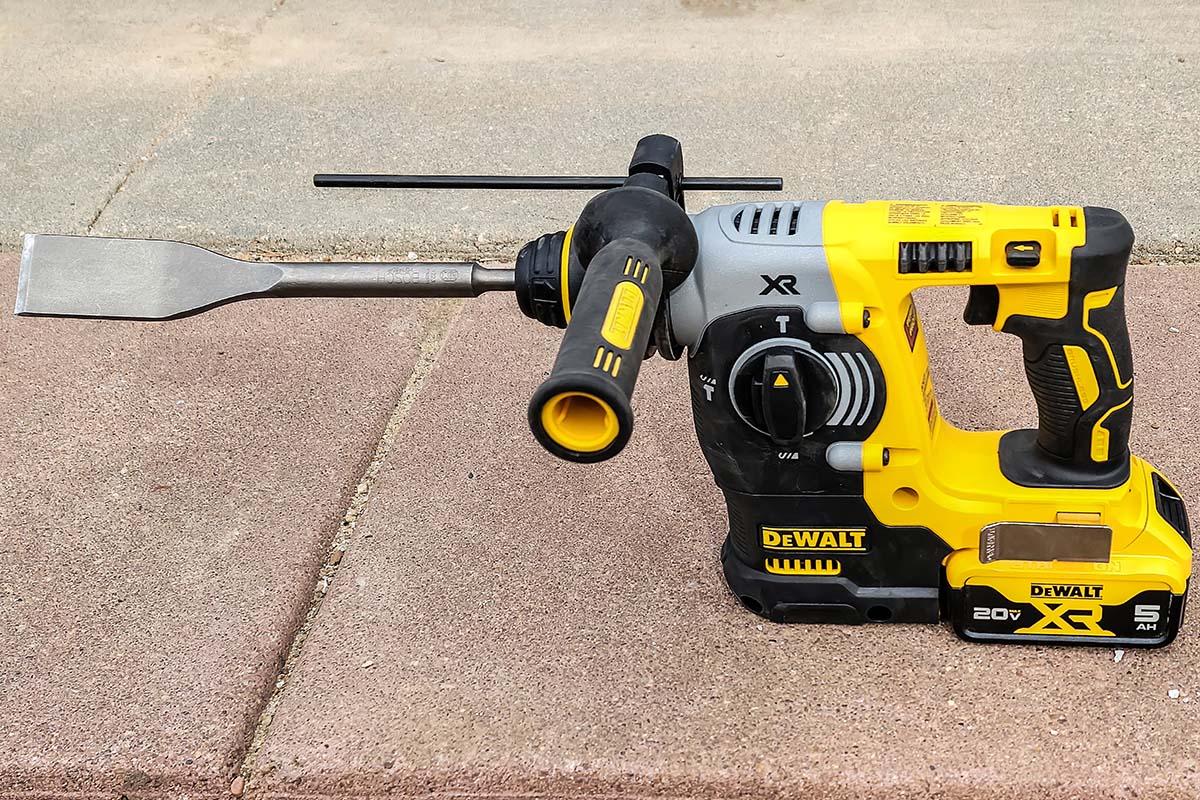

We may earn revenue from the products available on this page and participate in affiliate programs. Learn More ›
Standard drill drivers can handle most hole-drilling tasks in wood, but they don’t do so well when used to drill holes in concrete. That heavy-duty drilling task requires the souped-up power of a hammer drill—a tool that spins the bit while it simultaneously applies a hammering action. With the assistance of my husband, a general contractor, I tested the best cordless hammer drills available today, and the DeWalt Rotary Hammer Drill took top honors in my hands-on testing.
That said, the DeWalt DCH273B—a powerful cordless rotary hammer drill—isn’t suitable for everyone. But for those who frequently drill into concrete, brick, stone, or block, it just might be the ideal tool.
DeWalt 20V MAX Rotary Hammer Drill: At a Glance
Rating: 9.4/10
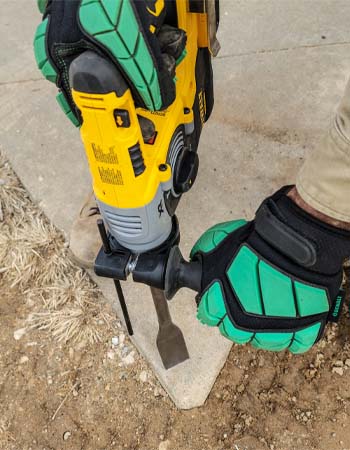
PROS
- 3 operating modes to choose from: drill, hammer drill, chipping
- Depth-stop rod makes it easy to know when the hole is the correct depth
- Low vibration and good ergonomics reduce arm and hand fatigue
CONS
- Slightly heavy to have good control when drilling through fine tile
- Removable accessory handle had a slight wobble when tightened
- Charging batteries took over 3 hours per battery
Get the DeWalt rotary hammer drill at:
What is the DeWalt hammer drill?
Hammer drills are not new—for decades, pros and DIYers have used them to drill holes in basement floors, patios, sidewalks, and foundations. The unique aspect of the DeWalt hammer drill we tested is its lack of a cord. Hammer drills require immense amounts of power to drill holes in masonry materials, and until very recently, battery technology wasn’t adequate to efficiently run a hammer drill.
With constant improvements in lithium-ion technology, however, that’s all changing. In testing, we paired the DeWalt cordless hammer drill, model DCH273B, with a DeWalt 5Ah rechargeable battery, which is considered a high-capacity battery. The tool didn’t come with a battery, and because hammer drills demand a lot of power, it’s probably best to use it with no less than a 5Ah battery. For those who have a higher-capacity battery, that’s even better.
This DeWalt hammer drill functions as a standard drill and hammer drill, as well as hammer only, which is a chipping function for use with a chipping bit.
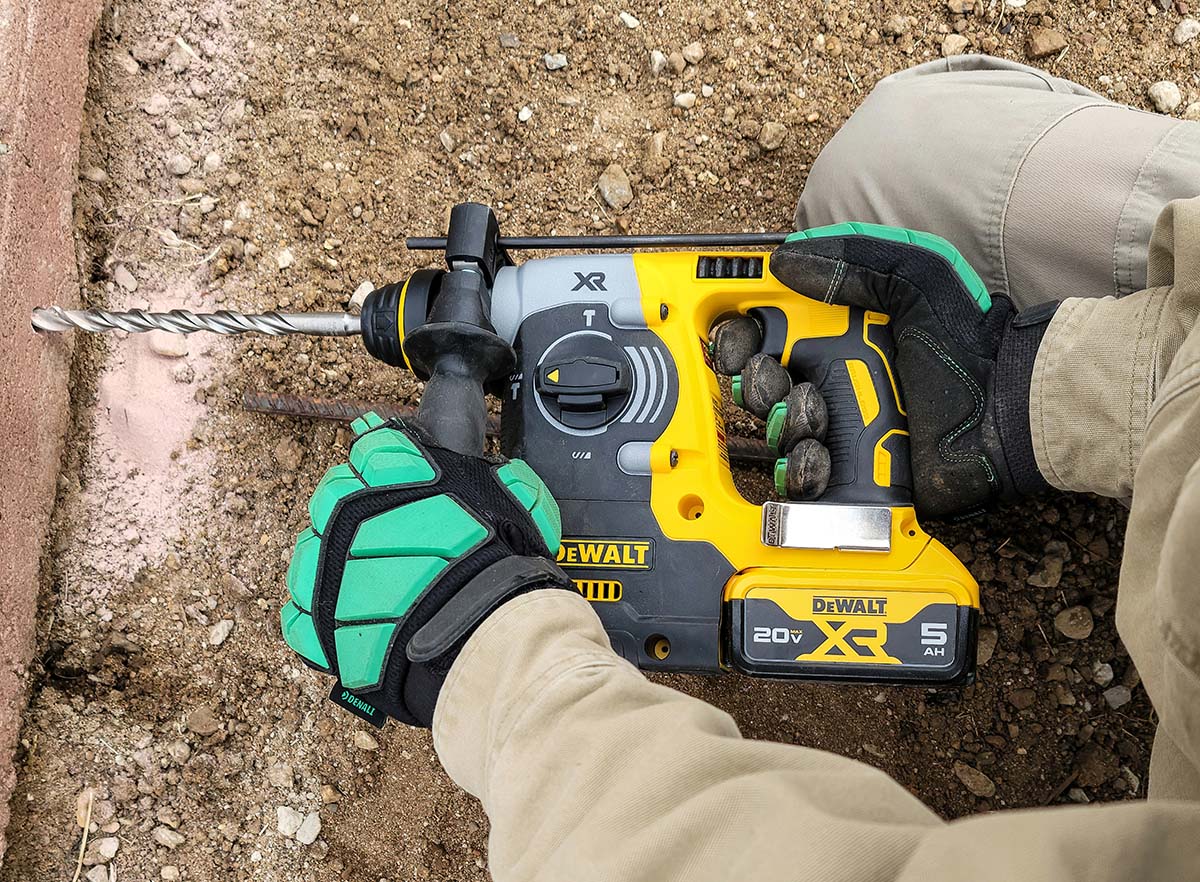
Is the DeWalt hammer drill easy to use?
The DeWalt hammer drill we tested was noticeably lighter than traditional rotary hammer drills, some of which can weigh as much as 18 pounds. Traditional corded models have always been too heavy for me to use with any degree of accuracy. Fortunately, the DeWalt cordless hammer drill weighs just 6.4 pounds without the battery, and with the 5Ah battery, it weighs just under 8 pounds. I was able to drill a few holes without straining too much. My husband thought it was wonderfully lightweight and easy to control.
The DCH273B is ergonomically designed and features a nonslip pistol grip and a detachable stabilization bar. The bar is adjustable and rotates to the most comfortable position. My favorite aspect of this cordless hammer drill was its reduced vibration. Older, corded hammer drills can quickly leave hands, wrists, and arms fatigued with their intense vibration. The DCH273B is lighter and has smoother and more refined action, but it’s still highly efficient.
It also features an SDS chuck, which is German for “steck, dreh, sitz,” or for English speakers, “insert, twist, stay.” This type of chuck is common on rotary hammer drills, while regular drill drivers usually come with a standard three-jaw chuck. I found it comparable to a three-jaw chuck, but it does require special SDS bits.
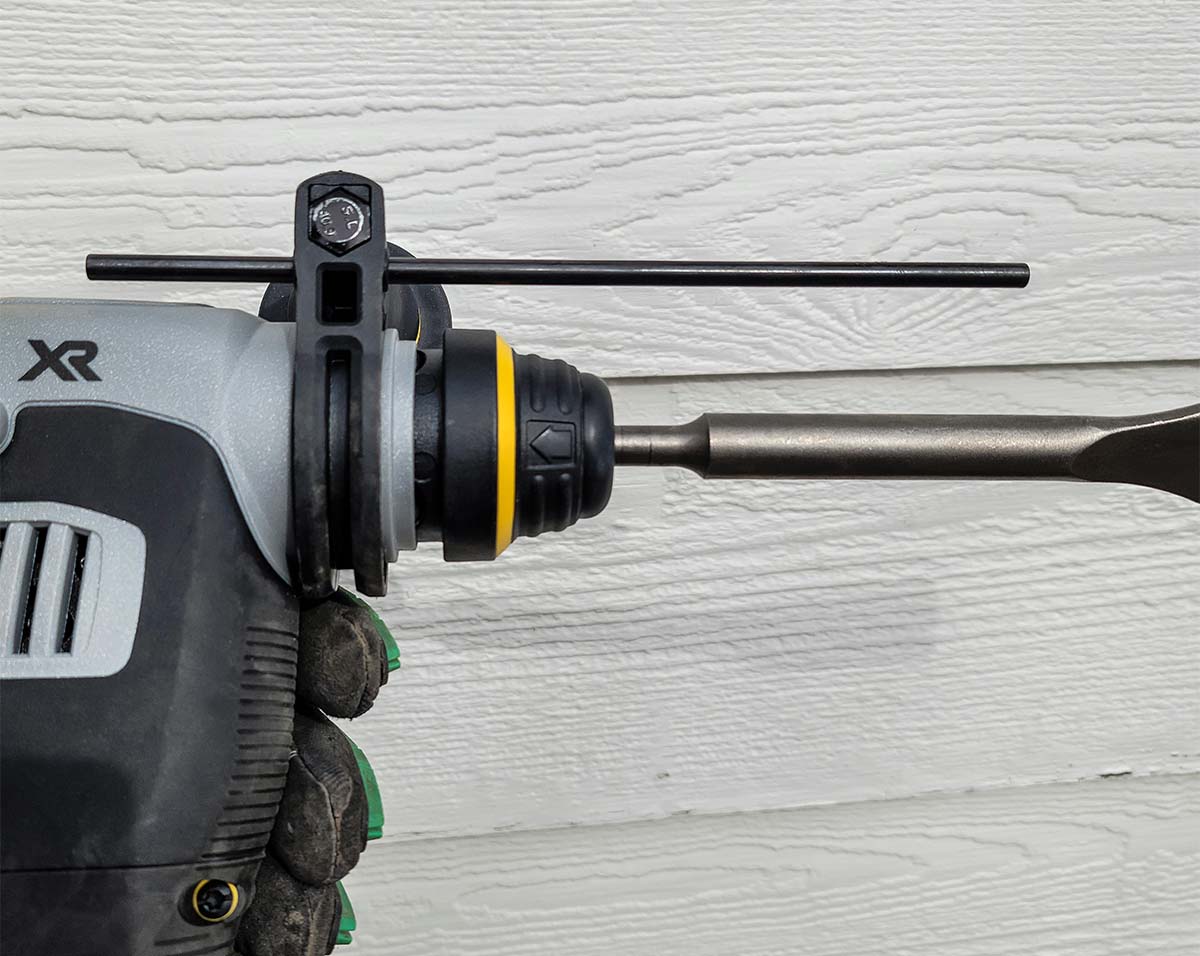
How efficient is the DeWalt rotary hammer drill?
The DeWalt hammer drill is a powerhouse. We fitted it with a large masonry drill bit and started testing by drilling holes in concrete. Its smooth action and power under pressure let us drill smooth holes in concrete and cinder bricks. We also tried it for drilling through ceramic tile—with a smaller bit—and it drilled evenly without chipping the surface glaze. It’s slightly on the beefy side for tile, however, and is really meant for heavier-duty tasks.
The DeWalt features a top speed of 1,050 rotations per minute (rpm), and it generates up to 4,600 beats per minute (BPM). Some of the other cordless hammer drills we tested were faster or came with higher BPM ratings, but the DeWalt isn’t made just for speed—it’s made to drill powerfully and efficiently.
We also fitted the hammer drill with a chip bit and switched it to “hammer only” mode. It displayed impressive power and efficiency for chipping away old mortar from bricks. The chipping feature is one that may not be used on a daily basis, but when it’s needed, users will be glad the DCH273B offers it. It’s so much quicker and easier than chipping away mortar with a hammer and chisel by hand.
Is the DeWalt cordless hammer drill worth the money?
As of this writing, the DeWalt rotary hammer drill sells for around $330, but that’s for the tool only. It can be purchased with two 5Ah rechargeable lithium-ion batteries for about $550. Alternatively, two 5Ah batteries, a charger, and a carry bag can be purchased separately for about $140.
Like other tool manufacturers, DeWalt makes batteries that can be swapped between tools. Folks who own other DeWalt power tools can save money by switching the batteries between the various devices.
That said, the DeWalt cordless rotary hammer drill is not the cheapest model on the market. The budget pick in our comprehensive testing sold for around $140, and that was with a battery and charger included. Still, the DeWalt features more power and is made for heavier-duty projects, so shoppers are getting what they pay for with this model.
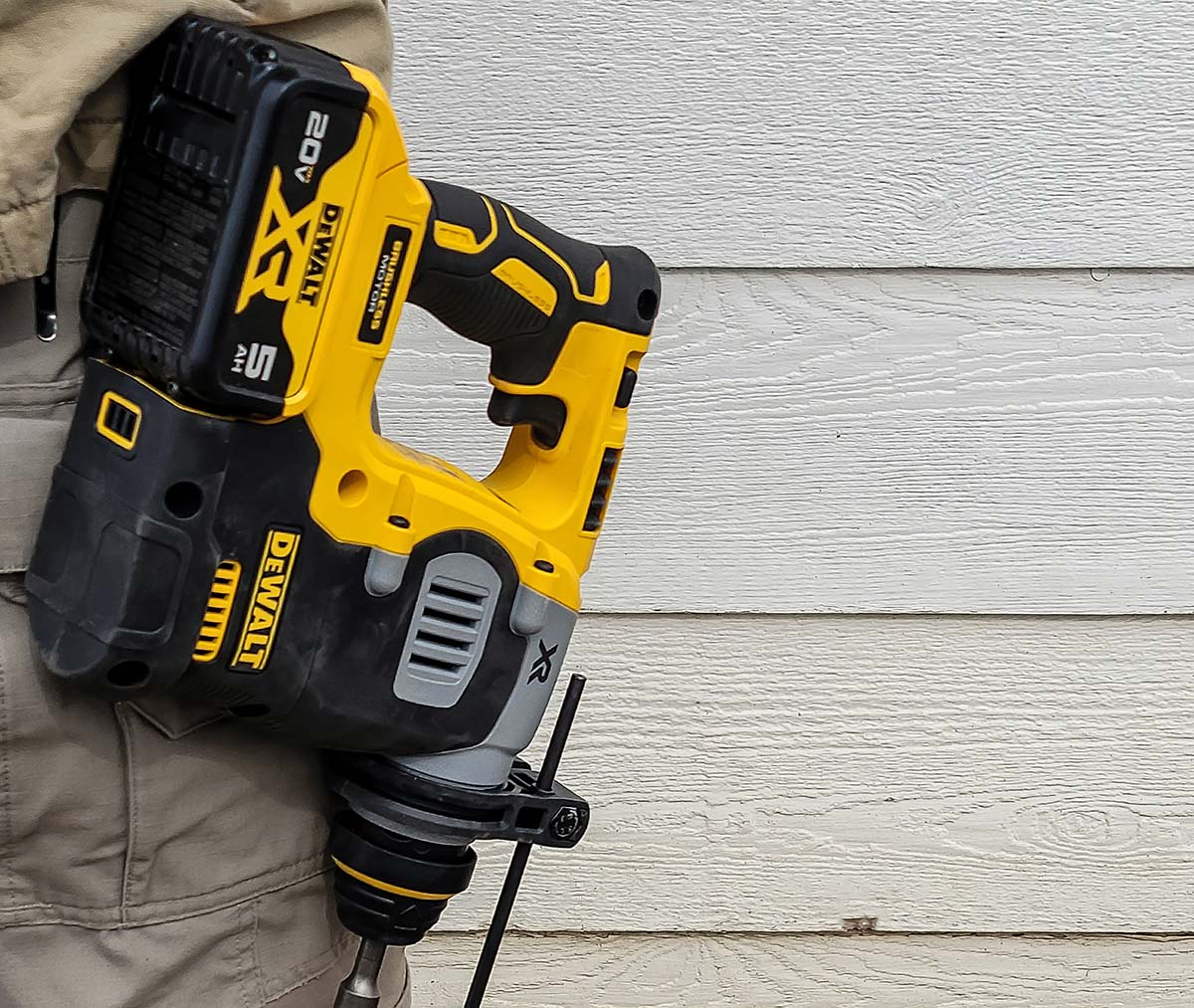
Is the DeWalt hammer drill right for you?
DIYers who need to drill an occasional hole in a basement floor or concrete foundation may not need the extra power of a rotary hammer drill. But for those who regularly need to drill holes in masonry or chip away old mortar, the DeWalt cordless hammer drill might be a good fit.
The DeWalt cordless hammer drill is well suited to professional use—stone countertop installers, foundation experts, and anyone who needs to drill into concrete or masonry during an average workday will likely benefit from this drill.
And because it’s cordless, it can be used anywhere—making it very handy for working in areas without access to an electrical outlet.
Where to Buy the DeWalt Rotary Hammer Drill
Get the DeWalt rotary hammer drill at:
Meet the Tester
Glenda Taylor is a product tester and writer specializing in construction, remodeling, and real estate. She and her husband own a general contracting company, and she is experienced in both residential and commercial building applications. Taylor tests a wide range of power tools as well as other home improvement, household, and lawn-and-garden products.
